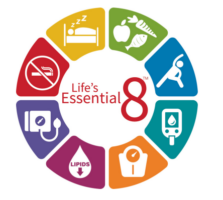Vermonters are tough and great at helping our neighbors in times of need like during the recent flooding. Remember, it’s important to take care of your own health, too. We are here to help.
Be Heart-Smart to Stay Safe and Healthy During and After Natural Disasters
- Take time now to write down any medical conditions, allergies and medications, including doses and the time you
take medications, along with your pharmacy name, address and phone number. - Keep the information with any other “go-kit” items you have handy for quick evacuation. If you do need to evacuate, even temporarily, bring your medications and your health information with you in a resealable plastic bag to help keep it dry.
- If your medication is lost, damaged by water or was left behind when you evacuated, research open pharmacies here to seek a refill as quickly as possible.
- Some states allow pharmacists to make medically necessary exceptions on certain types of prescription refills during an emergency. Information on all state emergency prescription refill laws is available at CDC.org (type “Prescription Preparedness” in the search box).
- Use our Patient Preparedness Plan if you have diabetes and use insulin.
- There you’ll find a checklist of supplies and for guidelines on how to prepare for an emergency.
Another way to prepare ahead for a possible medical emergency is to learn how to perform cardiopulmonary resuscitation (CPR) and how to use an automated external defibrillator (AED) until help arrives. If performed correctly, CPR can double or triple a person’s chance of survival. You could be saving the life of someone you love. A simple, one-minute video at HandsOnlyCPR.org shows you what you need to know to perform Hands Only CPR.
How We Help Keep Vermont Strong and Healthy
The American Heart Association makes sure Vermonters have resources to ensure a strong and healthy Vermont by advocating, helping to build coalitions and working with public health partners to secure funding for the following initiatives:
- Every Vermont student has free breakfast and lunch at school so that no child goes hungry – improving their learning.
- Sustained and long-term funding for early childhood education so more families have access to affordable childcare and so that childcare workers are paid fairly. We help Vermont kids get a healthy start!
- Helping schools implement Hands-only CPR training to create a new generation of lifesavers each year.
- Supporting funding for the Vermont Tobacco Control Program designed to help people quit tobacco.In times of stress, like COVID, flooding and other crises, vaping and smoking rates can increase but there are resources to help. As a result of the Association’s advocacy work, the Vermont Department of Health is able to provide resources to help Vermonters quit tobacco free of charge to Vermonters. Go to: https://802quits.org and get quit counseling as well as free nicotine gum, patches or lozenges.
Stress, Mental Health and Your Heart
Stress can have surprising effects on your heart health – and mental health. Fortunately, you can manage stress in ways such as:
- Exercising regularly. It can relieve stress, tension, anxiety and depression. Consider a nature walk, meditation or yoga.
- Making time for friends and family. It’s important to maintain social connections and talk with people you trust.
- Getting enough sleep. Adults should aim for seven to nine hours a night.
Maintaining a positive attitude. - Practicing relaxation techniques while listening to music.
- Finding a stimulating hobby that can be fun and distract you from negative thoughts or worries.
Figuring out how stress pushes your buttons is an important step in dealing with it. Identify sources of stress in your life and look for ways to reduce and manage them. A health care professional can help you find ways to manage your stress. Stress management or relaxation classes can also help. Look for them at community colleges, rehab programs,
in hospitals or by calling a therapist in your community.
Adopting serenity in the face of life’s challenges may help improve your perception of stress and result in better quality of life and heart health. Visit: Heart.org/stress.

Life’s Essential 8 are the key measures for improving and maintaining cardiovascular health, as defined by the American Heart Association. Better cardiovascular health helps lower the risk for heart disease, stroke and other
major health problems.
- EAT BETTER
- BE MORE ACTIVE
- QUIT TOBACCO
- GET HEALTHY SLEEP
- MANAGE WEIGHT
- CONTROL CHOLESTEROL
- MANAGE BLOOD SUGAR
- MANAGE BLOOD PRESSURE
For more information, visit MyLifeCheck.org.
The American Heart Association is your partner in keeping Vermont strong and healthy! Visit Heart.org/Vermont for the latest on heart and brain health and follow us @VTHeartAssoc.
